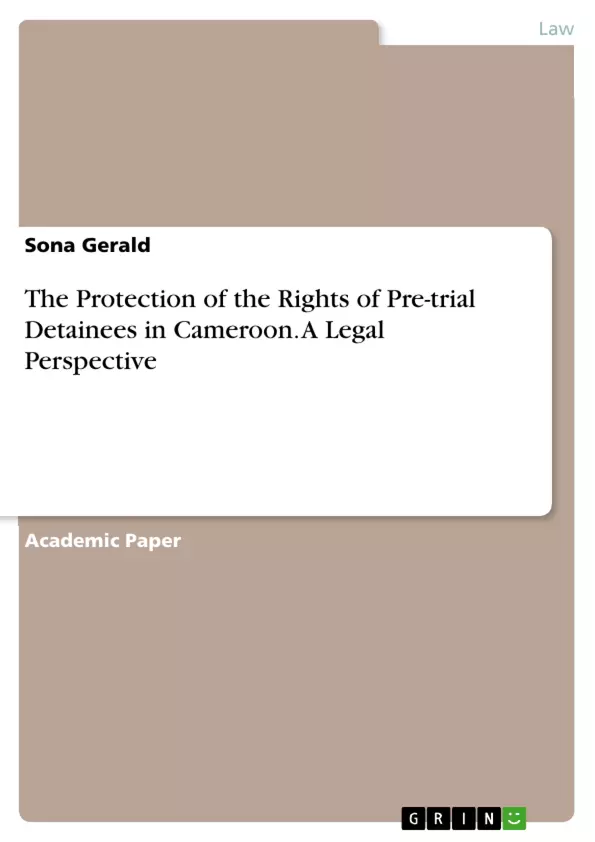This article delves into the longstanding issue of pre-trial detention, tracing its origins back to the colonial era in Cameroon, where individuals were held in custody pending trial outcomes. It examines the extent to which pre-trial detainees' rights are safeguarded in Cameroon, revealing significant violations within the current legal framework. Notably, the Criminal Procedure Code (CPC) of Cameroon falls short in adequately protecting the right to bail, leaving its discretion to the courts.
Employing qualitative research methodology, the study conducts a comprehensive doctrinal analysis of conventions, statutes, and cases. Findings indicate that while Cameroon's Constitution and CPC offer certain protections, these provisions are deemed insufficient, calling for reform. The study aims to evaluate the effectiveness of Cameroon's legal system in upholding prisoners' rights.
In clarifying the term "pre-trial," the article underscores its global prevalence across Europe and Africa, encompassing diverse demographics—from first-time offenders to the mentally ill and career criminals. The history of pre-trial detention in Cameroon is rooted in colonial practices, where detainees were coerced into administrative labor.
Post-World War I, there emerged heightened awareness of human dignity, catalyzing initiatives like the League of Nations' International Penal and Penitentiary Commission, which advocated for proper detainee treatment. Subsequently, the United Nations inherited this mission, emphasizing human dignity through international legal instruments, which are analyzed in the study.
Three justifications for pre-trial detention are outlined: reasonable belief in the alleged perpetrator's guilt, flight risk, and potential obstruction of justice. Fundamental human rights, including liberty, are emphasized, with acknowledgment of widespread unlawful arrests, lack of legal counsel, and inhumane treatment in many countries.
This article underscores the urgent need to reform Cameroon's legal framework, advocating for amendments to clarify ambiguous provisions, define undefined terms, and bolster lacking safeguards. By addressing these deficiencies, the study aims to enhance protections for pre-trial detainees and uphold fundamental rights within Cameroon's justice system.
Inhaltsverzeichnis (Table of Contents)
- INTRODUCTION
- OVERVIEW OF THE INTERNATIONAL STANDARD FOR THE PROTECTION OF THE RIGHTS OF PRE-TRIAL DETAINEES
- THE RIGHTS OF PRE-TRIAL DETAINEES IN CAMEROON
- The Right to Liberty and Unlawful Arrest and Detention
- The Right to Fair Hearing
- The Right to Counsel
- Freedom from Torture
- REDRESS MODEL OF ARBITRARY DETENTION
- CONCLUSION AND WAYFORWARD
Zielsetzung und Themenschwerpunkte (Objectives and Key Themes)
This article examines the protection of the rights of pre-trial detainees in Cameroon, focusing on the legal framework and its effectiveness in upholding these rights. It investigates the extent to which international standards are reflected in Cameroon's domestic law and explores areas where reforms are necessary.
- The legal framework for the protection of pre-trial detainees in Cameroon.
- The effectiveness of legal safeguards enshrined in the Constitution and the Criminal Procedure Code.
- The challenges and shortcomings in the implementation of these legal provisions.
- The need for reform to strengthen the protection of detainees' rights.
- The role of international law and conventions in shaping Cameroon's approach to pre-trial detention.
Zusammenfassung der Kapitel (Chapter Summaries)
- INTRODUCTION: This chapter introduces the concept of pre-trial detention and its historical roots in Cameroon, highlighting the evolution of legal frameworks and international standards for protecting detainees' rights. It also outlines the justifications for pre-trial detention.
- OVERVIEW OF THE INTERNATIONAL STANDARD FOR THE PROTECTION OF THE RIGHTS OF PRE-TRIAL DETAINEES: This chapter explores the international legal framework for the protection of pre-trial detainees, focusing on key documents like the Universal Declaration of Human Rights, the UN Standard Minimum Rules for the Treatment of Prisoners, and the International Covenants on Civil and Political Rights and Economic, Social, and Cultural Rights. The chapter examines the legal obligations imposed on states to ensure the rights of detainees and the challenges of implementing these standards.
- THE RIGHTS OF PRE-TRIAL DETAINEES IN CAMEROON: This chapter examines the legal framework for the protection of pre-trial detainees in Cameroon, analyzing the provisions of the Constitution and the Criminal Procedure Code. It delves into specific rights such as the right to liberty, fair hearing, counsel, and freedom from torture, outlining the existing safeguards and the challenges in ensuring their effective implementation.
- REDRESS MODEL OF ARBITRARY DETENTION: This chapter explores mechanisms for addressing arbitrary detention in Cameroon, analyzing existing legal remedies and the effectiveness of redress mechanisms in protecting detainees' rights. It examines the role of the courts, the prosecution, and other relevant actors in ensuring accountability for violations of detainees' rights.
Schlüsselwörter (Keywords)
This study delves into the complex issue of pre-trial detention, analyzing the legal framework, international standards, and practical realities of protecting the rights of pre-trial detainees in Cameroon. Key areas of focus include pre-trial detention, detainee rights, legal safeguards, criminal procedure, human rights, arbitrary detention, judicial review, and reform initiatives.
- Citar trabajo
- Sona Gerald (Autor), 2024, The Protection of the Rights of Pre-trial Detainees in Cameroon. A Legal Perspective, Múnich, GRIN Verlag, https://www.grin.com/document/1464577



